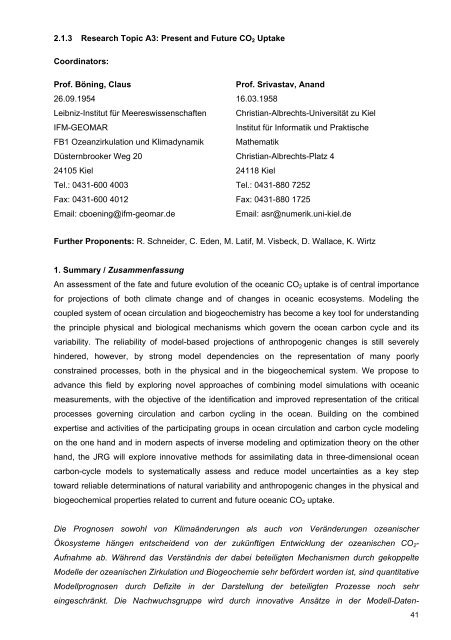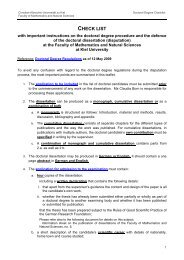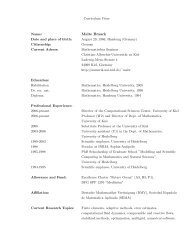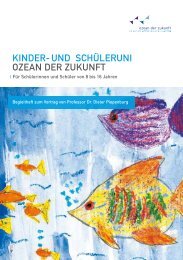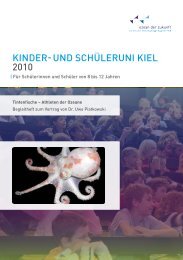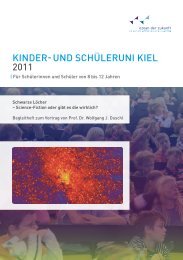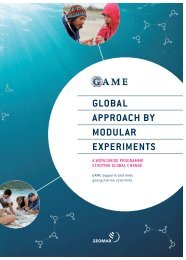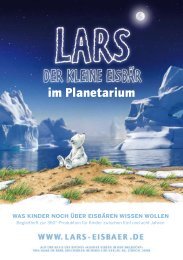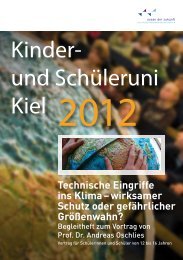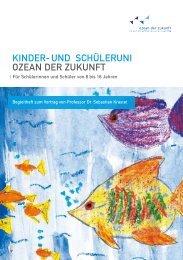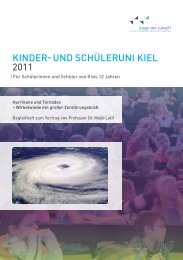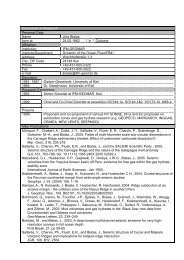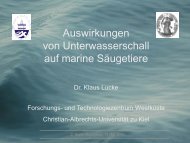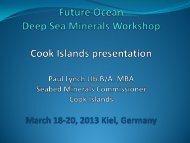Untitled - The Future Ocean
Untitled - The Future Ocean
Untitled - The Future Ocean
- No tags were found...
Create successful ePaper yourself
Turn your PDF publications into a flip-book with our unique Google optimized e-Paper software.
2.1.3 Research Topic A3: Present and <strong>Future</strong> CO 2 UptakeCoordinators:Prof. Böning, ClausProf. Srivastav, Anand26.09.1954 16.03.1958Leibniz-Institut für Meereswissenschaften Christian-Albrechts-Universität zu KielIFM-GEOMARInstitut für Informatik und PraktischeFB1 Ozeanzirkulation und Klimadynamik MathematikDüsternbrooker Weg 20Christian-Albrechts-Platz 424105 Kiel24118 KielTel.: 0431-600 4003Tel.: 0431-880 7252Fax: 0431-600 4012Fax: 0431-880 1725Email: cboening@ifm-geomar.deEmail: asr@numerik.uni-kiel.deFurther Proponents: R. Schneider, C. Eden, M. Latif, M. Visbeck, D. Wallace, K. Wirtz1. Summary / ZusammenfassungAn assessment of the fate and future evolution of the oceanic CO 2 uptake is of central importancefor projections of both climate change and of changes in oceanic ecosystems. Modeling thecoupled system of ocean circulation and biogeochemistry has become a key tool for understandingthe principle physical and biological mechanisms which govern the ocean carbon cycle and itsvariability. <strong>The</strong> reliability of model-based projections of anthropogenic changes is still severelyhindered, however, by strong model dependencies on the representation of many poorlyconstrained processes, both in the physical and in the biogeochemical system. We propose toadvance this field by exploring novel approaches of combining model simulations with oceanicmeasurements, with the objective of the identification and improved representation of the criticalprocesses governing circulation and carbon cycling in the ocean. Building on the combinedexpertise and activities of the participating groups in ocean circulation and carbon cycle modelingon the one hand and in modern aspects of inverse modeling and optimization theory on the otherhand, the JRG will explore innovative methods for assimilating data in three-dimensional oceancarbon-cycle models to systematically assess and reduce model uncertainties as a key steptoward reliable determinations of natural variability and anthropogenic changes in the physical andbiogeochemical properties related to current and future oceanic CO 2 uptake.Die Prognosen sowohl von Klimaänderungen als auch von Veränderungen ozeanischerÖkosysteme hängen entscheidend von der zukünftigen Entwicklung der ozeanischen CO 2 -Aufnahme ab. Während das Verständnis der dabei beteiligten Mechanismen durch gekoppelteModelle der ozeanischen Zirkulation und Biogeochemie sehr befördert worden ist, sind quantitativeModellprognosen durch Defizite in der Darstellung der beteiligten Prozesse noch sehreingeschränkt. Die Nachwuchsgruppe wird durch innovative Ansätze in der Modell-Daten-41


